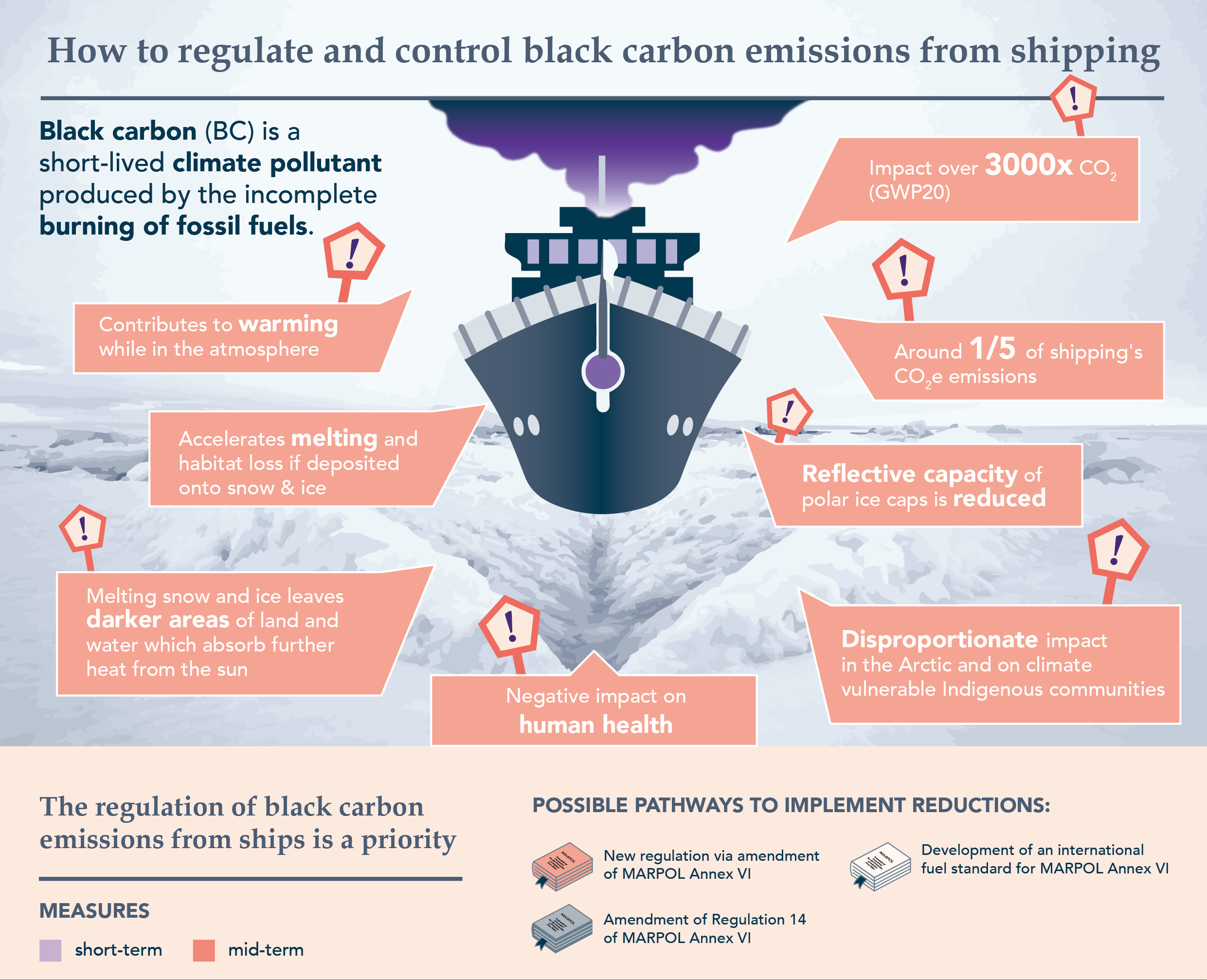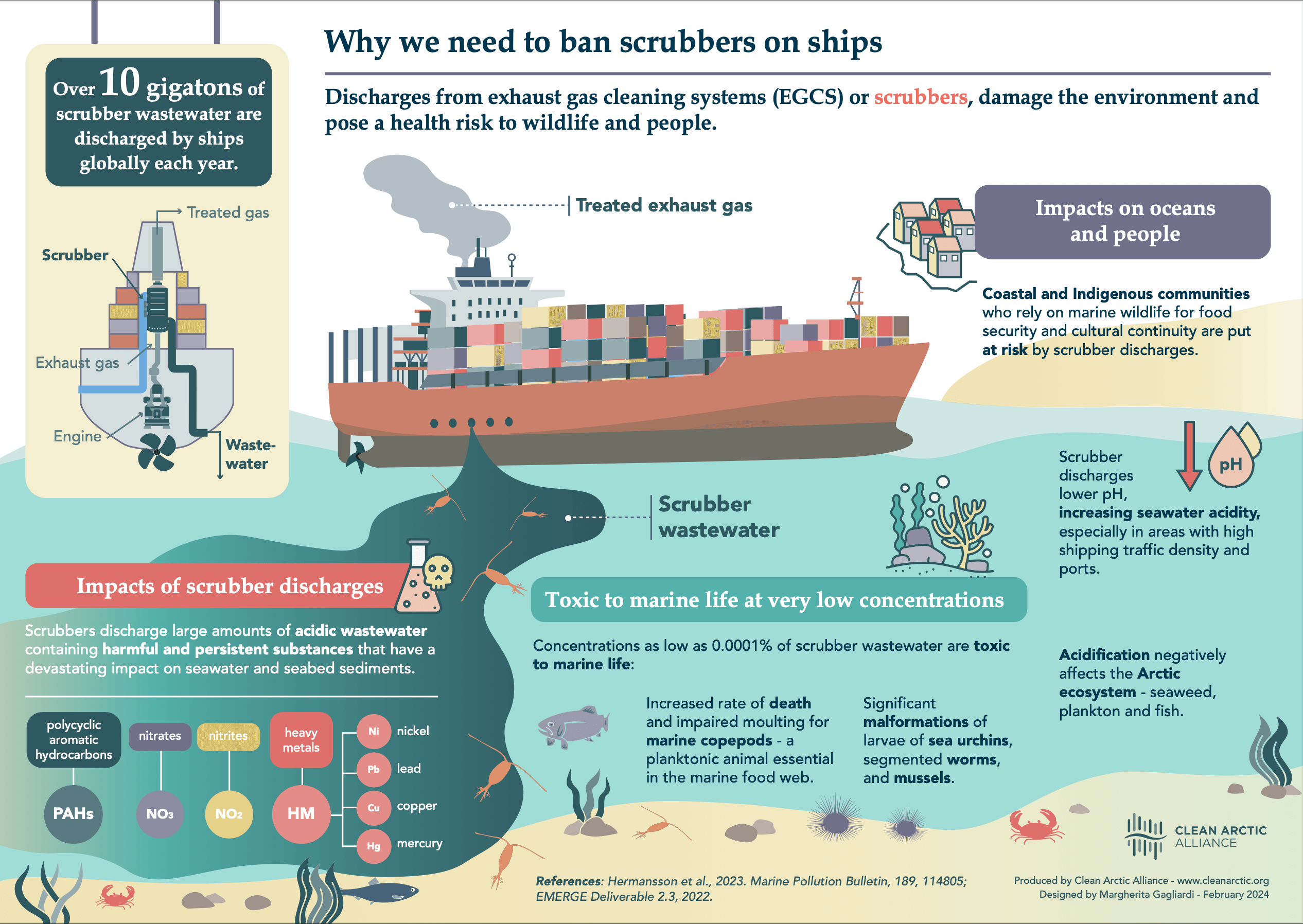
London, 23 February, 2024:- As a meeting of the International Maritime Organization’s (IMO) Sub-Committee on Pollution Prevention and Response (PPR 11) closed today in London, the Clean Arctic Alliance called on the IMO to urgently adopt a mandatory regulation requiring ships to move to distillate fuels while operating in and near to the Arctic, and for the maritime sector to follow a 2021 IMO resolution above 60 degrees north. In addition, the Alliance called on the international shipping sector to now implement the new guidance agreed this week to protect the Arctic from black carbon emissions from shipping [1].
“While PPR11 made some progress this week – agreeing guidance on best practise on black carbon control measures as well as emissions measurement, monitoring, and reporting, and also commencing an open discussion on the issue of fuel quality and aromaticity – the IMO is still failing to act on reducing black carbon emissions despite a switch to cleaner fuels being identified over a decade ago”, said Dr Sian Prior, Lead Advisor to the Clean Arctic Alliance. “A clear and credible path has already been identified – the IMO must now adopt a mandatory regulation requiring ships to move to distillate fuels while operating in and near to the Arctic.”
“During the meeting, some IMO member states agreed that recommendatory action would not be sufficient and stronger action was required – but then failed to push hard enough to achieve that action. Due to this ongoing travesty – with of emissions of a potent short-lived climate pollutant remaining unregulated – the Clean Arctic Alliance calls on the shipping sector to follow the IMO Resolution agreed in 2021 to voluntarily switch to distillate fuels to protect the Arctic, and to apply the guidance finalised during PPR11. We call on IMO member states to now turn the 2021 resolution into a regulation as an interim measure – switching to distillate fuels is a clear way forward in one of the world’s most climate vulnerable regions. Not only can it be achieved quickly, it will also ensure that black carbon emissions are rapidly reduced between 50% – 80% (depending on the engine and other variables), until work to develop a polar fuel standard can be concluded”, added Prior.
Infographic: How to regulate and control black carbon emissions from shipping
Scrubbers
During PPR11, many IMO member states acknowledged that discharge of scrubber wastewater is an environmental hazard and supported regulation of scrubbers on a regional basis. Regrettably, there was no consensus between those that support a ban or regulation, those that support regulation but have no wish to penalise shipowners that have installed scrubbers, and those that have yet to be convinced that regulation is required. As a result PPR could only encourage member states and interested parties including NGOs to bring proposals to PPR 12 in 2025.
“While shipping industry and oil industry parties claimed that scrubbers are ‘OK’, several member states and environmental groups countered this old and tired narrative, which is based on the 20th century myth that ‘the solution to pollution is dilution’”, said Eelco Leemans, Technical Advisor to the Clean Arctic Alliance. “We are now seeing increasing support from IMO member states for regulation of scrubbers, particularly in coastal waters and sensitive areas such as the Arctic. The IMO’s failure to identify next steps means that it has in effect given the green light for countries to implement restrictions, while many states have given a red light to the use of scrubbers in their waters.”
- Infographic: Why We Need to Ban Scrubbers on Ships & Why the Use of Scrubbers to Limit Air Pollution is Flawed
- Webinar on Scrubbers: The End of an End of Pipe Solution?
Heavy Fuel Oil
PPR 11 also agreed guidelines on mitigation measures to reduce the risks of using and carrying for use of heavy fuel oil (HFO) in Arctic waters for approval by MEPC 82, later in the year.
“More important than agreeing these guidelines”, said Andrew Dumbrille, Strategic and Technical Advisor to the Clean Arctic Alliance, “is the need for ships still using HFO in the Arctic to switch to cleaner alternative fuels, when the deadline prohibiting the use and carriage for use of HFO by ships operating in Arctic waters takes effect from 1 July 2024.“
“Regrettably, as some ships will continue to use HFO under an exemption or waiver until 1 July 2029, the Clean Arctic Alliance is calling for shipping companies to take responsibility for their environmental impact by making better fuel choices. Not only will this reduce the risks of a HFO spill in the Arctic but it will also reduce black carbon emissions too – a win-win situation which tackles both the climate and biodiversity crises together. Prioritising measures which are at the intersection of planetary threats should be a high priority for the IMO and its member states.”
About Black Carbon and the Arctic
Black carbon is a short-lived climate pollutant, produced by the incomplete burning of fossil fuels, with an impact more than three thousand times that of CO2 over a 20 year period. It makes up around one-fifth of international shipping’s climate impact. Not only does it contribute to warming while in the atmosphere, black carbon accelerates melting if deposited onto snow and ice – hence it has a disproportionate impact when released in and near to the Arctic. The melting snow and ice exposes darker areas of land and water and these dark patches then absorb further heat from the sun and the reflective capacity of the planet’s polar ice caps is severely reduced. More heat in the polar systems – results in increased melting. This is the loss of the albedo effect.
Declines in sea ice extent and volume are leading to a burgeoning social and environmental crisis in the Arctic, while cascading changes are impacting global climate and ocean circulation. Scientists have high confidence that processes are nearing points beyond which rapid and irreversible changes on the scale of multiple human generations are possible. Scientists say it is now too late to save summer Arctic sea ice, and research has shown that “preparations need to be made for the increased extreme weather across the northern hemisphere that is likely to occur as a result.”
Black carbon also has a negative impact on human health, and recent research has found black carbon particles in the body tissues of foetuses, following inhalation by pregnant mothers.
The need to reduce emissions of black carbon because of both the climate and health impacts has been long recognised. On land, considerable effort has been made to ban dirtier fuels in power stations, to install diesel particulate filters on land-based transport, and to improve the burning of dry wood – all to reduce emissions of black carbon and improve air quality. However, at sea the same efforts have not yet been made.
Find out more about black carbon
Infographic: How to regulate and control black carbon emissions from shipping
ENDS
Contact:
Dave Walsh, Communications Advisor, [email protected], +34 691 826 764
Notes:
Check out the video of the Clean Arctic Alliance pre-PPR 11 briefing
[1] Resolution MEPC 342, Protecting the Arctic from Black Carbon Emissions
https://wwwcdn.imo.org/localresources/en/OurWork/Environment/Documents/Air%20pollution/MEPC.342%2877%29.pdf
About the Clean Arctic Alliance
Made up of 22 not-for-profit organisations, the Clean Arctic Alliance campaigns to persuade governments to take action to protect the Arctic, its wildlife and its people.
Members include: The Altai Project, Alaska Wilderness League, Bellona, Clean Air Task Force, Ecology and Development Foundation ECODES, Environmental Investigation Agency, Friends of the Earth US, Global Choices, Green Global Future, Green Transition Denmark, Greenpeace, Iceland Nature Conservation Association, International Cryosphere Climate Initiative, Nature And Biodiversity Conservation Union, Ocean Conservancy, Pacific Environment, Seas At Risk, Surfrider Foundation Europe, Stand.Earth, Transport & Environment, WWF and Zero.
More more information visit https://www.cleanarctic.org/


